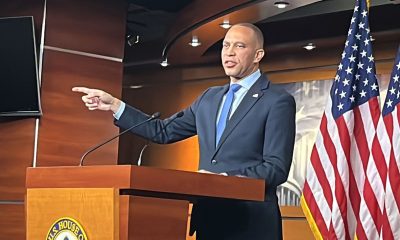Florida Courier
Sanders’ free college proposal and HBCUs
FLORIDA COURIER — With a majority of HBCUs in Republican-leaning states, what happens if state legislators refuse the federal dollars (as they did under the Affordable Care Act) for public institutions, or cut state appropriations to be filled in by federal dollars, which can change from year to year under new sessions of Congress?
By J.L. Carter, Sr.
Vox.com has a solid writeup on Bernie Sanders’ plan for saving the nation’s college students trillions in student loan debt. Here’s their breakdown of the proposed “College For All” Act:
- To receive the federal funding, states and tribes would essentially have to show the Department of Education that they will maintain higher education and need-based financial aid funding and rely less on adjunct faculty to teach classes.
- States and tribes would also have to show that they can cover the full cost of higher education for the poorest families, those who earn less than $25,000. For tribal colleges with at least 75 percent low-income student enrollment – students eligible for the Pell Grant – the federal government would cover 95 percent of costs to eliminate tuition and fees.
- The funding would prohibit underwriting salaries and non-academic construction projects and would be awarded in a dollar-for-dollar matching program for state investments for public schools. HBCUs and minority-serving institutions (MSIs) would also qualify for this federal funding.
- Sanders’s proposal allocates $1.3 billion per year to reduce tuition and fees at private nonprofit universities and colleges with at least 35 percent of students from low-income households. Roughly 200 institutions would be eligible, Sanders’s office said.
A few questions
The concept sounds untenable in the political sphere.
With a majority of HBCUs in Republican-leaning states, what happens if state legislators refuse the federal dollars (as they did under the Affordable Care Act) for public institutions, or cut state appropriations to be filled in by federal dollars, which can change from year to year under new sessions of Congress?
Will HBCUs have to compete for shared funding with Minority Serving Institutions – a handful of which are large state-funded institutions in Texas and California with far more stable budget outlooks than those at Black colleges in the same regions?
Will increasing Pell Grant and work-study cut into other budget lines for HBCUs, such as Upward Bound programming or STEM preparatory programs from high schools, or graduate education funding?
If funding is attached to schools’ capacity to hire more full-time faculty and less adjuncts, will HBCUs be in an immediate position to comply with these rules, given the high percentages of undergraduate courses taught by adjunct professors?
If more emphasis is placed on low-income students attending college, will the federal government revise its view of performance-based ranking tools like the College Scorecard to sift schools based on entering SAT scores, average year of completion and post-graduate outcomes?
After all, if HBCUs are being encouraged to enroll even more poor students than whom are already walking through the doors, then the government and accreditors must publicly account for the work that will be required to catch them up and get them out of the doors with degrees in 4-6 years.
More plans coming
Plans from Sanders, Elizabeth Warren and others are inching towards a more comprehensive view of how to educate an increasingly under-resourced nation.
But HBCU presidents, alumni and students have to be diligent in asking the right questions about from where exactly the money for these programs will come, and what the price may require in scaling back the HBCU mission of access and opportunity.
Jarrett L. Carter, Sr. is publisher of HBCU Digest (www.hbcudigest.com).
This article originally appeared in the Florida Courier.
#NNPA BlackPress
COMMENTARY: Lying to get DNA evidence from innocent people should not be tolerated
FLORIDA COURIER — Voluntarily submitted. That is the context for a second tragedy that has now unfolded. In October of 2018, Orlando police went to the home of Eleanor Holmes in Valdosta, Georgia. There the police approached Mrs. Holmes at her front gate and asked her if she would consent to providing a DNA cheek-swab so that police could identify a possible relative in Orlando who had been found dead many years earlier. That was a lie. Orlando police were actually looking for evidence to link Mrs. Holmes son to the murder of Christina Franke.

By Leroy Pernell, Florida Courier
A horrible tragedy occurred in 2001 when 25-year-old Christina Franke was brutally murdered in her central Florida home. Without leads, the case remained unsolved for 17 years.
In 2018, Orlando police, using a relatively new technique referred to as “Target Testing” sought out family DNA information for use in a program called GEDMatch. The acceptance of such programs in court has yet to be fully determined.
However, a key component has been the use of family DNA voluntarily submitted in programs such as Ancestry.com and 23andMe.
Voluntarily submitted. That is the context for a second tragedy that has now unfolded. In October of 2018, Orlando police went to the home of Eleanor Holmes in Valdosta, Georgia.
There the police approached Mrs. Holmes at her front gate and asked her if she would consent to providing a DNA cheek-swab so that police could identify a possible relative in Orlando who had been found dead many years earlier. That was a lie.
Orlando police were actually looking for evidence to link Mrs. Holmes son to the murder of Christina Franke.
Not guilty plea
It is unclear whether police had sufficient evidence to form probable cause for such suspicion but what was clear is that police had already used this lie to trick other members of Mrs. Holmes family into providing a DNA sample.
The information gained from the police deception was used to ultimately charge Mrs. Holmes son, Benjamin Jr., with the death of Christina.
Benjamin has pled not guilty and it remains to be seen what role this largely unproven and deceptively received DNA evidence (the DNA not of the accused but of his family) will play in that trial.
Trickery is not ethical
Issues of the DNA reliability aside, the issue here is not the guilt or innocence of the accused but whether an American citizen not accused of anything, can be tricked into causing her child to be prosecuted.
Taking personal DNA information from private citizens, without a warrant and through deceit, is an outrageous, unreasonable and unconstitutional invasion of privacy. The Florida Association of Criminal Defense Lawyers in 2018 challenged the proposition that lies can be used to gain consent to enter a home.
That situation involved a defendant’s home. This situation is much worse. Mrs. Holmes is not a suspect and information from her body receives much greater Fourth Amendment protection than does the home.
The Florida Supreme Court has only approved obtaining saliva samples by deception-obtained consent only from a defendant who was already in custody pursuant to probable cause.
Protected privacy violated?
The Fourth Amendment protects all private citizens; the innocent perhaps even more than those suspected of criminal activity. The taking of DNA from a person not suspected of a crime, by lying to that person, in order to obtain evidence against her son, was shocking behavior.
It was also unnecessary. There was no indication of an attempt to obtain a warrant, or indeed, being honest with Mrs. Holmes as to the real purpose. She may well have cooperated in order to clear her son’s name.
Nor is there any indication that exigent circumstances existed that might justify warrantless action.
While there is precedent for allowing police to lie to a suspect after the suspect has knowingly, intelligently and voluntarily waived his or her right to remain silent, in order to obtain a confession there is no such precedent for innocent persons to be tricked into an invasion of their privacy.
Consent to a search obtained through trickery is not a valid consent particularly as to personal and private information within our bodies. Such information is entitled to the highest level of Fourth Amendment protection.
Real consent
DNA information contained within our bodies, whether it be blood, urine or saliva has consistently been held to be protected by the Fourth Amendment from unreasonable removal from our bodies by the state.
Not only has such received Fourth Amendment protection, but such actions have been held to require a warrant in the absence of exigent circumstances. With the passage of 17 years, the situation can hardly be described as an exigent-emergency circumstance.
In 1968, the United States Supreme Court said that when police obtained consent to enter a home by lying about the existence of a warrant, such consent was invalid.
While invasion of our protected privacy can be justified by consent, that consent requires real consent. Not consent based on a lie. LeRoy Pernell is a professor at Florida A&M University’s College of Law in Orlando.
The post Lying to get DNA evidence from innocent people should not be tolerated appeared first on Florida Courier.
#NNPA BlackPress
COMMENTARY: The Black opinion on Trump’s impeachment
FLORIDA COURIER — As Democrats around the country protest and raise their voices to impeach and remove President Trump, the Congressional Black Caucus and other Black Caucuses’ are silent. Representatives such as Rep. Maxine Waters, and the late Rep. Elijah Cumming have been in the forefront of the impeachment inquiry. But the collective Black voice around the country has preferred to stay in the background with no major position and agenda.
Where is the rage from the Black community on the impeachment of President Donald Trump?
The Black community in 2019 appears to be invisible and lethargic when it comes to politics, and as a collaborative force no one seems to care.
When the Black community is analyzed, there is an award show every month. Many of the Black stars are spending money and weeks getting the right gown or tuxedo, and the perfect hairstyle for the big night.
There is the 2019 Essence Black Women in Hollywood Award Luncheon, 2019 ASCAP’s Rhythm & Soul Music Awards, 2019 American Black Film Festival, and the 2019 ASCAP Women behind the Music.
In every Black organization, in each of the major cities across the country there are major Black award events and dinners where the tickets are $100.00 to $300.00. There are excellent speakers, fantastic singers, and there are three and four-course meals.
But in all the hoopla, crying and praying, politics and a Black Agenda appear to be left out of the picture.
Unbothered
As Democrats around the country protest and raise their voices to impeach and remove President Trump, the Congressional Black Caucus and other Black Caucuses’ are silent. Representatives such as Rep. Maxine Waters, and the late Rep. Elijah Cumming have been in the forefront of the impeachment inquiry.
But the collective Black voice around the country has preferred to stay in the background with no major position and agenda.
Many of the Black grassroots, youth, stars, and Black churches are asking the question why we should care.
The Grio reporter Sophia Nelson stated first we have to care because we are citizens of this great Republic, and secondly, the removal of President Trump from office means the installment of Vice President, Mike Pence.
Vice President Pence’s track record as governor with Blacks and people of color has been focused on voter suppressions and a state police raid on a registration program aimed at signing up Black voters.
What’s at stake
In the Senate, it will take 67 senators to remove President Trump from office, and from the very beginning of the impeachment proceedings, Senate Majority Leader Mitch McConnell has been in lockstep with the White House.
The president and Republicans have put together a smear campaign and attacked loyal public servants, and high-ranking State Department diplomats.
“Senators like Graham have attacked and demeaned the FBI, calling them ‘scum’ and worse. All of this is only feeding the ‘gaslighting’ that Republicans pundits routinely engage in on national TV and that includes Attorney General William Barr. It’s dangerous,” said Nelson.
Blacks can put their heads in the sand, and say that the impeachment is too complicated, and we don’t like politics. But there is a constitutional crisis in America, I can tell all Blacks and people of color that our very democracy is at stake.
President Trump must be held accountable and Speaker of the House Nancy Pelosi strategically needs Black support around the country.
Sidelines no more
Speaker Pelosi is fighting Senate Majority Leader Mitch McConnell by not handing over the Articles of Impeachment until there is a fair trial there. Trump has turned American politics into a den of corruption and thieves, and the Republican Party is blind and complicit with breaking the law.
President Trump is nasty, mean, petty, and vindictive, and Blacks and people of color must speak with one voice, and be engaged.
Blacks can no longer sit on the sidelines, but we must be educated and take a political position. We need to get the youth and community-engaged.
Our message must collaborate and partner with other ally organizations and leaders, authentic, attention-grabbing, specific, and packaged for Blacks and people of color.
It is time for the Black voice to ring out loud and clear, saying we support the impeachment of President Donald Trump, and we will fight with Speaker Nancy Pelosi and the Democratic Party.
There is power in the Black community across the country, and we must be engaged and unified.
Roger Caldwell, a community activist, author, journalist, radio host and CEO of On Point Media Group, lives in Orlando. Contact him at jet38@bellsouth.net.
This article originally appeared in the Florida Courier.
#NNPA BlackPress
Bible courses proposed for Florida public schools
FLORIDA COURIER — Sen. Dennis Baxley, R-Ocala, filed the bill (SB 746) for consideration during the 2020 legislative session, which starts Jan. 14. Rep. Kimberly Daniels, D-Jacksonville, filed an identical bill (HB 341) last month in the House. The bill, in part, would require courses providing an “objective study of the Bible, including, but not limited to, a course on the Hebrew Scriptures and Old Testament of the Bible; a course on the New Testament of the Bible; and a course on the Hebrew Scriptures, the Old Testament of the Bible, and the New Testament of the Bible.”
NEWS SERVICE OF FLORIDA
A Senate Republican filed a proposal Monday that would require high schools to offer elective courses in the study of the Bible and religion.
Sen. Dennis Baxley, R-Ocala, filed the bill (SB 746) for consideration during the 2020 legislative session, which starts Jan. 14. Rep. Kimberly Daniels, D-Jacksonville, filed an identical bill (HB 341) last month in the House.
The bill, in part, would require courses providing an “objective study of the Bible, including, but not limited to, a course on the Hebrew Scriptures and Old Testament of the Bible; a course on the New Testament of the Bible; and a course on the Hebrew Scriptures, the Old Testament of the Bible, and the New Testament of the Bible.”
Also, the bill says courses would be required to follow “all state and federal laws and guidelines in maintaining religious neutrality and accommodating the diverse religious views, traditions, and perspectives of all students in the school.
“A course offered pursuant to this section may not endorse, favor, or promote or disfavor or show hostility toward a particular religion, religious perspective, or nonreligious faith.”
The post Bible courses proposed for public schools appeared first on Florida Courier.
This article originally appeared in the Florida Courier.
-

 Activism3 weeks ago
Activism3 weeks agoOakland Post: Week of November 12 – 18, 2025
-

 Activism4 weeks ago
Activism4 weeks agoOakland Post: Week of November 5 – 11, 2025
-

 Activism2 weeks ago
Activism2 weeks agoIN MEMORIAM: William ‘Bill’ Patterson, 94
-

 Activism3 weeks ago
Activism3 weeks agoHow Charles R. Drew University Navigated More Than $20 Million in Fed Cuts – Still Prioritizing Students and Community Health
-

 #NNPA BlackPress3 weeks ago
#NNPA BlackPress3 weeks agoThe Perfumed Hand of Hypocrisy: Trump Hosted Former Terror Suspect While America Condemns a Muslim Mayor
-

 Bay Area3 weeks ago
Bay Area3 weeks agoNo Justice in the Justice System
-

 #NNPA BlackPress3 weeks ago
#NNPA BlackPress3 weeks agoProtecting Pedophiles: The GOP’s Warped Crusade Against Its Own Lies
-

 #NNPA BlackPress2 weeks ago
#NNPA BlackPress2 weeks agoTrump’s Death Threat Rhetoric Sends Nation into Crisis
























































